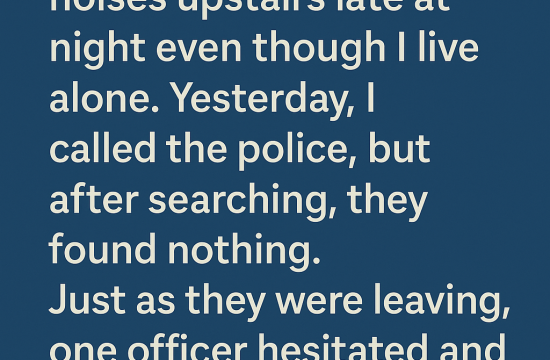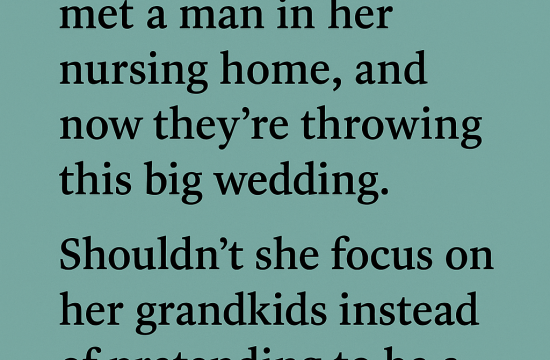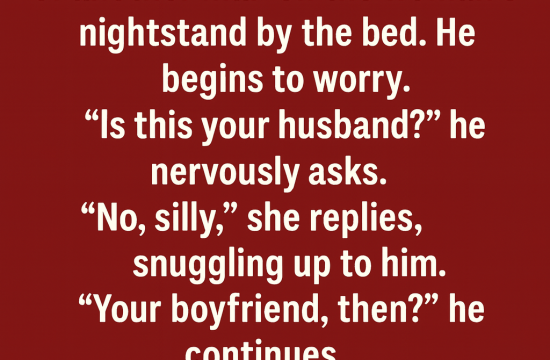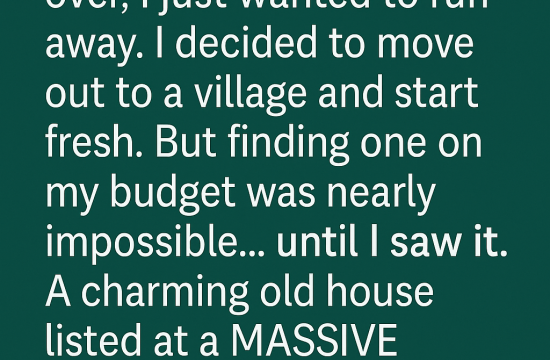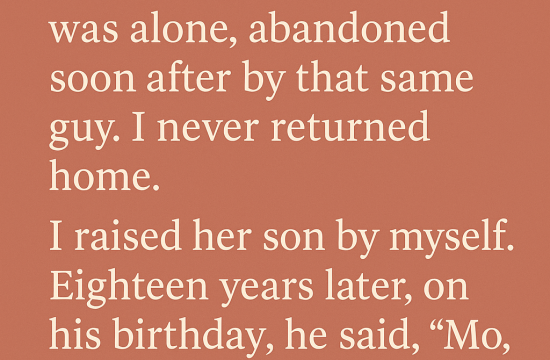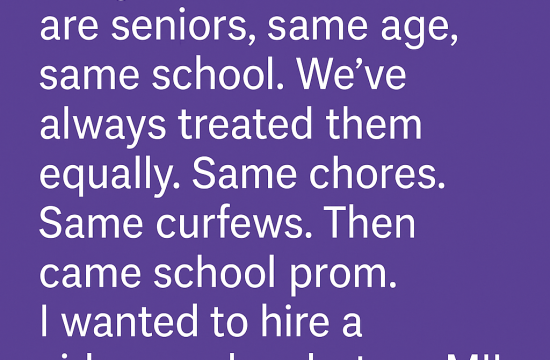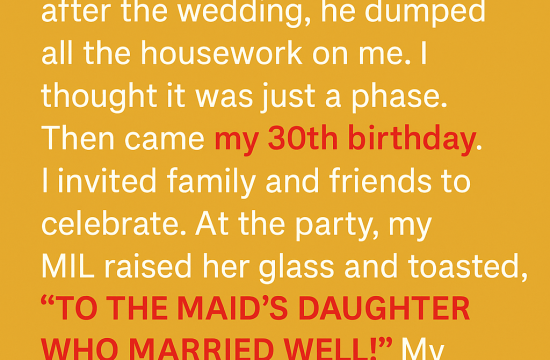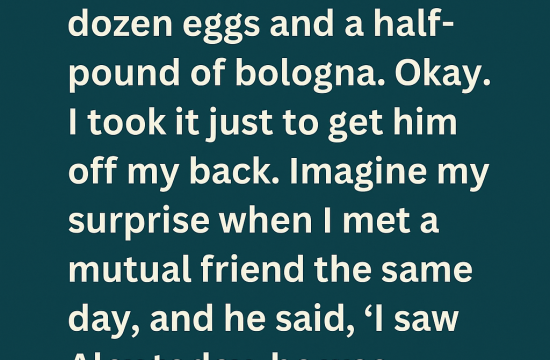My mom always labeled me the demon child in front of the family.
She said I was fat, jobless, homeless, and that I broke into her home.
Days ago, at a family reunion, my boyfriend suddenly stood up and said:
“Can we stop pretending like she’s the problem?”
It went dead silent. You could hear my aunt pouring wine like a waterfall.
My heart was racing. I didn’t expect him to say anything. I thought he’d sit through it like I always had, quietly swallowing the shame while Mom painted me as some deranged monster.
“She’s not fat,” he said. “She’s recovering from an eating disorder. She’s not jobless—she quit a job that made her cry in the bathroom every day. She’s not homeless—she left a house that was emotionally unsafe.”
No one spoke. My uncle froze mid-meatball. My cousin choked on her drink trying not to laugh.
Mom gave one of her trademark tight-lipped smiles. “Well,” she said, brushing invisible lint off her sleeve, “excuse me for telling the truth.”
But it wasn’t the truth. Not the whole truth.
The truth is—I wasn’t always like this.
I used to be the golden child. Straight A’s. Varsity soccer. Violin recitals.
I did everything right.
But when I turned 19 and said I wanted to go to art school, everything changed.
“Artists are losers,” she said. “You’ll never make money drawing stick figures.”
I tried to keep the peace. Switched my major to business. I cried through three semesters. I got stress migraines every week.
At 21, I dropped out. I couldn’t fake it anymore.
That’s when the “demon” label began.
“You’re wasting your life. You’re embarrassing me. Why can’t you be like your cousin Jessica? She just got hired at a law firm.”
But Jessica had a dad who paid her rent and therapy.
I had silence and hand-me-downs.
I moved out. Worked odd jobs. Shared a cramped apartment that smelled like onions and bleach.
I built a portfolio, freelanced, and sometimes lived on toast for three days just to afford paint.
Then I met Ray.
We bumped elbows at a thrift store—he was buying loose markers.
I dropped my sketchpad. He picked it up and flipped through it without asking. Normally I’d get mad.
But he smiled at a drawing and said, “This one looks like it has a soul.”
Nobody had said that before.
We started dating. He worked construction by day and taught himself coding by night.
He never made me feel small.
When I told him how suffocating home felt, he just listened.
So when the family reunion came and Mom insisted I attend, I brought him.
I hoped if she saw I had someone kind and stable, she’d back off.
She didn’t.
She loudly called me her “little disappointment.”
Told Ray I used to cry at spelling bees. Said I once “stole her dog” after losing a job.
Ray looked uneasy. I fake-laughed like always.
Then she said, “And don’t get me started on her break-in. I had to change the locks after she barged in like a criminal. She even left dishes in the sink!”
That’s when he stood up. And everything shifted.
My grandma slowly set her fork down.
“She broke in?” she asked. “Why would she need to break in?”
“Because she locked me out,” I said. “After my panic attacks. I came back from the clinic and my key didn’t work.”
Gasps. Real ones.
Uncle Ben whispered, “You were hospitalized?”
I nodded. “Only for a week. But she told everyone I was being dramatic.”
Jessica, of all people, asked, “Wait—Auntie, is that true?”
Mom looked caught. For a second, I thought she might apologize.
Instead, she rolled her eyes.
“You always make yourself the victim, don’t you?”
Ray reached for my hand. His was steady. Mine trembled.
We left early.
But something shifted after that.
Cousins began texting. Aunts reached out. Even Jessica called:
“I used to think you were lazy. But now I realize… you were just surviving.”
For the first time, I didn’t feel invisible.
Ray and I kept going. I got some small commissions—portraits, logos, even a children’s book gig.
I opened a tiny online shop.
Nothing fancy. But it was something.
Then I got a message from a woman named Eliza.
She ran a nonprofit for young artists from tough backgrounds.
She’d found my drawings online—Ray had helped me post them.
“We’re looking for someone to lead a six-week workshop for teen girls who’ve been through trauma,” she wrote.
“Your story… your art… it could help them.”
I cried reading it.
I cried harder when she said, “And we pay.”
It wasn’t the money.
It was finally being seen.
I didn’t tell Mom. Until she randomly called one day.
“You’re not still mad, are you?” she asked.
I said nothing.
“Your cousin says you’re doing something with painting now. That’s cute.”
Cute.
I almost hung up. But something in me had changed.
“Actually,” I said, “I’m leading an art therapy group for teens. And starting to make a living from commissions.”
There was a pause.
Then a single, flat: “Oh.”
That “oh” said everything.
“I’m glad you’re… keeping busy,” she finally said.
That was her version of support.
And honestly, I didn’t need more.
The girls at the workshop needed me.
I showed up for them.
They showed me what healing looked like—raw, messy, real.
One day, a girl named Tara came up after class.
“You remind me of my sister,” she said.
“She used to draw me safe places when Mom was drunk.”
“Did it help?” I asked.
She nodded.
“It made me feel like someone saw me.”
That night I told Ray. He hugged me.
Then pulled out a small box.
A ring.
Simple. Gold. With a tiny engraved leaf.
“Like your logo,” he said. “Like growth.”
I said yes through tears.
We planned a small wedding—just close friends and a few of the girls.
I didn’t invite Mom. But she came anyway.
Sat in the back row. Quiet.
I saw her during the vows, holding a wrinkled tissue.
Afterward, she walked up slowly.
“You look happy,” she said.
“He’s… good to you.”
I nodded.
She handed me a small box. Inside was a silver charm bracelet with a tiny paintbrush.
“I found it at a flea market,” she said. “I thought of you.”
Not an apology. Not really.
But maybe the closest she could come.
We didn’t become close after that.
But she started texting photos of flowers she painted.
I think it was her way of building a bridge.
I let her.
Because healing isn’t about pretending it never hurt.
It’s about deciding what to carry forward.
And I chose to carry the love I have now.
The safety. The purpose.
The home I made with Ray.
The strength I give to the girls.
The art once called “useless,” now helping others heal.
So if you’ve ever been called something you’re not—lazy, broken, dramatic—
Please remember:
Their labels aren’t your truth.
Your path may be messy. But it’s yours.
And it can still bloom.
I was once called a demon child.
Today, I’m someone’s safe place.
And that’s the title I choose to keep.




